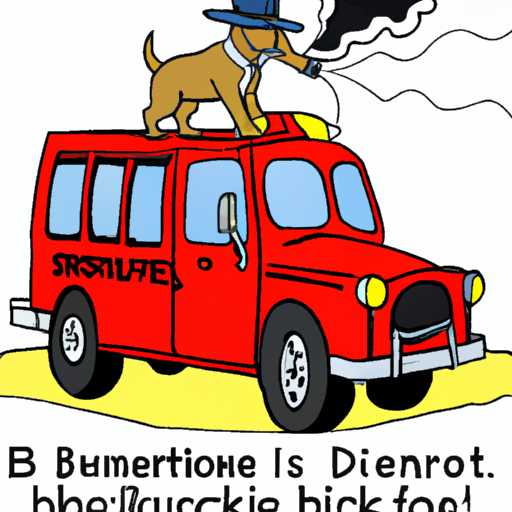If you’ve ever lived in a city or near a fire station, you’ve likely noticed a peculiar occurrence. As soon as the sirens of a fire truck begin to wail, dogs in the vicinity start to howl. This behavior, while somewhat amusing, can also be quite baffling. Why do dogs howl at fire trucks? This article will delve into the science behind this curious canine behavior, exploring the reasons and underlying mechanisms that trigger this response.
Table of Contents
- Understanding Dog Communication
- The Effects of Sound Frequency
- The Role of Genetics and Evolution
- The Emotional Response
- How to Manage Your Dog’s Howling
- Frequently Asked Questions
Key Takeaways
- Dogs communicate through a variety of vocalizations, including barking, whining, and howling.
- The high-pitched sirens of fire trucks can be distressing for dogs, triggering a howling response.
- Howling is a primordial behavior that is deeply ingrained in a dog’s genetic makeup.
- It’s possible to manage your dog’s howling through positive reinforcement and desensitization techniques.
Understanding Dog Communication
Dogs have a complex system of communication that involves a variety of vocalizations, body language, and even scent marking. Among these vocalizations, howling holds a unique place. In the wild, wolves – the ancestors of our domesticated dogs – use howling as a method of long-distance communication. It serves several purposes, such as reuniting separated pack members or warning off intruders from their territory. You can learn more about dog communication in this detailed guide.
The Effects of Sound Frequency
A significant reason why dogs howl at fire trucks is due to the high frequency of the sirens. Dogs have a much wider hearing range than humans, and they are particularly sensitive to high-frequency sounds. This is why many dogs react not only to sirens but also to other high-pitched noises, such as vacuums or certain musical instruments. The sound of a fire truck siren can be distressing for a dog, leading to a howling response. This comprehensive article delves further into the effects of sound frequency on dogs.
The Role of Genetics and Evolution
The howling response to sirens can also be linked to a dog’s genetic makeup. Wolves, the ancestors of domestic dogs, are known for their iconic howl. They use this vocalization to communicate over long distances, especially when the pack is separated. When a domestic dog hears the siren of a fire truck, it may trigger this primal instinct to howl in response. For a deeper understanding of the genetic and evolutionary aspects of dog behavior, check out this informative article.
The Emotional Response
In some cases, a dog may howl at sirens due to an emotional response. The loud, high-pitched sound can cause distress or anxiety, leading the dog to howl. This is a form of vocalization that may help them cope with these unsettling feelings.
How to Manage Your Dog’s Howling
If your dog’s howling becomes a problem, there are several steps you can take to manage this behavior. One method is through positive reinforcement. Reward your dog when they remain calm and quiet during a siren. Another technique is desensitization, which involves gradually exposing your dog to the sound of sirens at a low volume and slowly increasing it over time. This helpful guide provides more tips on managing your dog’s behavior.
Frequently Asked Questions
1. Why does my dog howl at sirens but not other sounds?
Dogs are particularly sensitive to high-frequency sounds. The siren of a fire truck falls within this range and may trigger a howling response.
2. Is it harmful for my dog to howl at sirens?
While it can be distressing for dogs, it’s not necessarily harmful. However, if your dog appears anxious or distressed, it’s worth discussing with a vet.
3. Can I train my dog not to howl at sirens?
Yes, through techniques such as positive reinforcement and desensitization, it’s possible to manage this behavior.
To conclude, the howling of dogs at fire trucks is a complex behavior rooted in their genetic makeup, sensitivity to high-frequency sounds, and potentially, an emotional response. Understanding these factors can help in managing this behavior if it becomes problematic.



